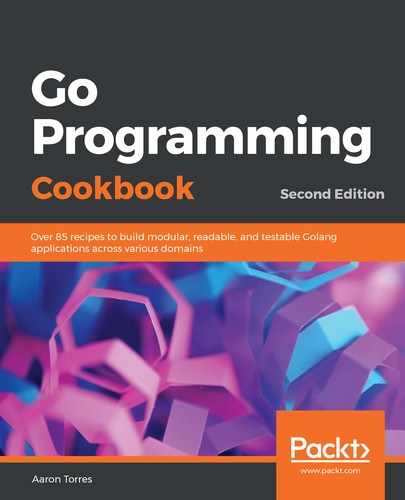These steps cover writing and running your application:
- From your Terminal or console application, create a new directory called ~/projects/go-programming-cookbook/chapter2/envvar.
- Navigate to this directory.
- Run the following command:
$ go mod init github.com/PacktPublishing/Go-Programming-Cookbook-Second-Edition/chapter2/envvar
You should see a file called go.mod that contains the following:
module github.com/PacktPublishing/Go-Programming-Cookbook-Second-Edition/chapter2/envvar
- Copy tests from ~/projects/go-programming-cookbook-original/chapter2/envvar, or use this as an opportunity to write some of your own code!
- Create a file called config.go with the following contents:
package envvar
import (
"encoding/json"
"os"
"github.com/kelseyhightower/envconfig"
"github.com/pkg/errors"
)
// LoadConfig will load files optionally from the json file
// stored at path, then will override those values based on the
// envconfig struct tags. The envPrefix is how we prefix our
// environment variables.
func LoadConfig(path, envPrefix string, config interface{})
error {
if path != "" {
err := LoadFile(path, config)
if err != nil {
return errors.Wrap(err, "error loading config from
file")
}
}
err := envconfig.Process(envPrefix, config)
return errors.Wrap(err, "error loading config from env")
}
// LoadFile unmarshals a JSON file into a config struct
func LoadFile(path string, config interface{}) error {
configFile, err := os.Open(path)
if err != nil {
return errors.Wrap(err, "failed to read config file")
}
defer configFile.Close()
decoder := json.NewDecoder(configFile)
if err = decoder.Decode(config); err != nil {
return errors.Wrap(err, "failed to decode config file")
}
return nil
}
- Create a new directory named example and navigate to it.
- Create a main.go file with the following contents:
package main
import (
"bytes"
"fmt"
"io/ioutil"
"os"
"github.com/PacktPublishing/
Go-Programming-Cookbook-Second-Edition/
chapter2/envvar"
)
// Config will hold the config we
// capture from a json file and env vars
type Config struct {
Version string `json:"version" required:"true"`
IsSafe bool `json:"is_safe" default:"true"`
Secret string `json:"secret"`
}
func main() {
var err error
// create a temporary file to hold
// an example json file
tf, err := ioutil.TempFile("", "tmp")
if err != nil {
panic(err)
}
defer tf.Close()
defer os.Remove(tf.Name())
// create a json file to hold
// our secrets
secrets := `{
"secret": "so so secret"
}`
if _, err =
tf.Write(bytes.NewBufferString(secrets).Bytes());
err != nil {
panic(err)
}
// We can easily set environment variables
// as needed
if err = os.Setenv("EXAMPLE_VERSION", "1.0.0"); err != nil
{
panic(err)
}
if err = os.Setenv("EXAMPLE_ISSAFE", "false"); err != nil {
panic(err)
}
c := Config{}
if err = envvar.LoadConfig(tf.Name(), "EXAMPLE", &c);
err != nil {
panic(err)
}
fmt.Println("secrets file contains =", secrets)
// We can also read them
fmt.Println("EXAMPLE_VERSION =",
os.Getenv("EXAMPLE_VERSION"))
fmt.Println("EXAMPLE_ISSAFE =",
os.Getenv("EXAMPLE_ISSAFE"))
// The final config is a mix of json and environment
// variables
fmt.Printf("Final Config: %#v ", c)
}
- Run go run main.go.
- You may also run the following commands:
go build
./example
- You should see the following output:
$ go run main.go
secrets file contains = {
"secret": "so so secret"
}
EXAMPLE_VERSION = 1.0.0
EXAMPLE_ISSAFE = false
Final Config: main.Config{Version:"1.0.0", IsSafe:false,
Secret:"so so secret"}
- The go.mod file may be updated, and the go.sum file should now be present in the top-level recipe directory.
- If you copied or wrote your own tests, go up one directory and run go test, and ensure that all the tests pass.
